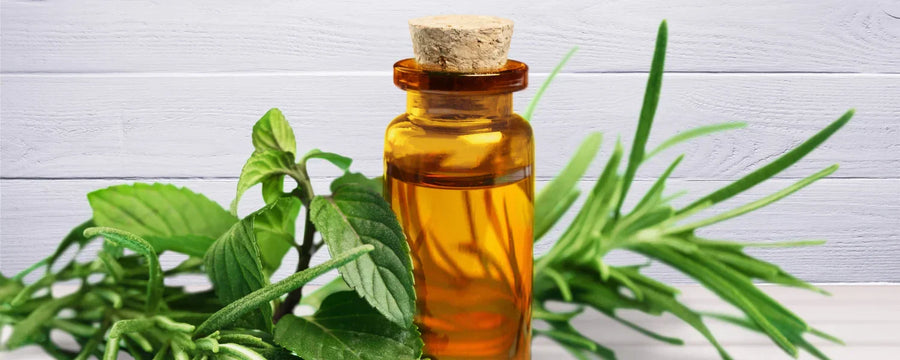

Read through by Dorthe Kristensen
Hairdresser and former co-owner of the award-winning hairdressing chain Zoom by Zoom
With many years of experience in the hairdressing industry, Dorthe has advised many customers about hair and hair care. Dorthe has read through this blog entry to ensure high quality and professionalism. This blog post is professionally updated on January 29, 2025.
Table of contents
Tea tree oil has been utilized for its medicinal properties for centuries. In recent years, it has gained popularity in hair care for its effectiveness in addressing various scalp and hair concerns.
What is tea tree oil?
Tea tree oil is a natural essential oil extracted from the leaves of the Australian Melaleuca alternifolia tree. It is well-known for its antimicrobial, antibacterial, and anti-inflammatory properties, which make it highly beneficial for scalp and hair health. These properties help combat dandruff by targeting the underlying causes, such as fungal buildup, while also reducing irritation and soothing the scalp. Additionally, tea tree oil promotes a clean and healthy environment for the scalp, which is essential for encouraging hair growth and maintaining overall hair vitality. Its natural effectiveness has made it a popular choice in hair care routines.
Is tea tree oil good for hair?
Tea tree oil has garnered attention for its potential benefits in hair care. Its antimicrobial and anti-inflammatory properties make it a popular choice for addressing various scalp and hair issues. Many report positive outcomes, such as reduced dandruff and improved scalp health, after incorporating tea tree oil into their hair care routines. However, individual experiences may vary, and it's essential to use the oil correctly to avoid potential irritation. Always perform a patch test before full application and consider consulting a dermatologist if you have sensitive skin or existing scalp conditions.
What does tea tree oil do for hair?
Tea tree oil is a versatile ingredient with numerous benefits for hair health. Known for its natural cleansing, antifungal, and anti-inflammatory properties, it helps address common issues like dandruff, product buildup, and dryness. Incorporating tea tree oil into your routine can lead to healthier hair and a balanced scalp.
Fights dandruff
Tea tree oil is widely recognized for its effectiveness in combating dandruff. Its antifungal properties work by targeting the yeast responsible for dandruff, helping to reduce flakiness and irritation. Additionally, tea tree oil soothes itchiness, providing relief for an uncomfortable scalp. With regular use, it can restore balance to the scalp’s natural microbiome, minimizing the likelihood of future dandruff flare-ups.
By keeping the scalp clean and healthy, tea tree oil promotes an overall improvement in scalp condition, making it an essential addition to hair care routines for those dealing with dandruff and related concerns.
Promotes hair growth
Tea tree oil is an effective natural remedy for promoting healthy hair growth. By cleansing the scalp and removing impurities, product buildup, and excess oil, it helps to keep hair follicles clear and functioning properly. Additionally, its anti-inflammatory properties reduce irritation and inflammation around the hair roots, creating an optimal environment for growth. Healthy hair follicles are essential for producing strong, resilient strands, and tea tree oil supports this process.
Regular use of tea tree oil not only enhances scalp health but also encourages thicker and healthier hair over time, making it a valuable addition to any hair care routine.
Prevents product buildup
Frequent use of styling products, shampoos, and conditioners can leave behind residue on the scalp, which clogs hair follicles and disrupts healthy hair growth. Tea tree oil is a natural and effective cleanser that breaks down and removes this buildup, ensuring the scalp remains clean and balanced.
By unblocking hair follicles, it promotes proper functioning and enhances overall hair health. A clean scalp is essential for maintaining strong, healthy strands, and regular use of tea tree oil helps achieve this, leaving hair looking refreshed, lightweight, and more vibrant. It’s an excellent addition to any cleansing routine.
Soothes dry scalp
Tea tree oil is a natural remedy for addressing a dry scalp. Its moisturizing properties deeply hydrate the scalp, helping to combat dryness and flakiness. At the same time, its anti-inflammatory effects reduce redness, itching, and irritation, providing soothing relief for common scalp discomforts.
By restoring moisture and calming inflammation, tea tree oil helps create a balanced and healthy scalp environment, which is essential for overall hair health. Regular use can prevent recurring dryness and keep your scalp feeling comfortable and nourished, making tea tree oil a valuable addition to any hair care routine.
Have you ever used tea tree oil for hair?
How to use tea tree oil for hair
Tea tree oil is a versatile addition to your hair care routine when used properly. Dilute it with carrier oils, add a few drops to your shampoo, or use it in a scalp massage to maximize its benefits. These methods ensure safe and effective use for healthier hair.
Importance of dilution
Tea tree oil is a potent essential oil that should never be applied directly to the scalp due to its high concentration, which can cause irritation or allergic reactions. To use it safely and effectively, it’s essential to dilute tea tree oil with a carrier oil. Carrier oils, such as coconut oil, almond oil, or sesame oil, help reduce the intensity of tea tree oil while retaining its beneficial properties.
A common dilution ratio is 2–3 drops of tea tree oil per tablespoon of carrier oil. This ensures that the oil is gentle enough for the scalp while still providing its antimicrobial and soothing effects.
Mixing the oils not only makes tea tree oil safer to use but also enhances its spreadability, making it easier to apply evenly across the scalp. Proper dilution is key to reaping the benefits of tea tree oil without risking irritation or discomfort.
Adding a few drops to regular shampoo
Enhancing your shampoo with tea tree oil is a simple and effective way to incorporate its benefits into your daily hair care routine. Tea tree oil’s natural cleansing and antimicrobial properties make it an excellent addition to combat scalp issues like dandruff, dryness, and itchiness. To use, add 2–3 drops of tea tree oil to a dollop of your regular shampoo just before applying it. Mix thoroughly to ensure the oil is evenly distributed without altering the shampoo’s consistency.
When washing your hair, massage the tea tree oil-infused shampoo into your scalp, focusing on areas prone to irritation or buildup. Leave it on for a minute or two to allow the oil to penetrate and work its magic. Rinse thoroughly and follow with conditioner if needed.
This method enhances your shampoo’s effectiveness, leaving your scalp refreshed and your hair feeling clean, nourished, and healthier with regular use.
Scalp massage
A scalp massage with a tea tree oil blend is a powerful way to support hair and scalp health. To prepare the blend, mix 2–3 drops of tea tree oil with a tablespoon of a carrier oil such as coconut, almond, or sesame oil. These carrier oils not only dilute the tea tree oil for safe use but also add their own nourishing benefits to the treatment.
Apply the mixture to your dry scalp and gently massage it using your fingertips. Use circular motions to stimulate blood flow and ensure even distribution of the oil. Focus on problem areas prone to dryness, irritation, or dandruff. The massage helps loosen fungal and bacterial deposits, unclogging hair follicles and creating a healthier environment for hair growth.
Leave the mixture on for at least 20–30 minutes before rinsing thoroughly with a gentle shampoo. Regular scalp massages can improve scalp health, reduce buildup, and promote stronger, healthier hair.
Precautions to take when using tea tree oil for hair
While tea tree oil is highly beneficial for hair care, it’s essential to use it properly to avoid potential side effects.
Perform a patch test before use: To check for allergic reactions or sensitivity, apply 1–2 drops of diluted tea tree oil to a small area on your inner forearm. Wait 24 hours to observe any signs of irritation, redness, or itching. If no reaction occurs, the oil is safe to use on your scalp. This simple step ensures that tea tree oil won’t cause discomfort or adverse effects.
Avoid overuse to prevent irritation: Tea tree oil is potent, and overuse can lead to skin irritation, dryness, or redness. Always dilute it with a carrier oil, such as coconut or almond oil, and use it in moderation. A few drops are sufficient for most applications, whether in a scalp massage or shampoo.
By following these precautions, you can safely enjoy the benefits of tea tree oil while maintaining healthy hair and scalp.
Use tea tree oil for better hair health
Tea tree oil is a natural solution for promoting healthier hair and scalp. Its powerful antifungal and anti-inflammatory properties help combat dandruff, soothe dryness, and support hair growth, making it a versatile addition to any hair care routine.
By incorporating tea tree oil into practices such as scalp massages, shampoo blends, or hair treatments, you can address common scalp issues and maintain balanced, nourished hair. With regular use, tea tree oil can enhance your overall hair health, leaving it feeling stronger, cleaner, and more vibrant. Embrace this natural remedy for long-lasting scalp and hair wellness.
Get a 10% discount code sent to you
Receive the best tips and tricks for your hair from Lotte and Nanna 🥰
 2-5 day delivery
2-5 day delivery
 25.000+ satisfied customers
25.000+ satisfied customers
 Satisfaction Guarantee
Satisfaction Guarantee









